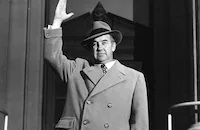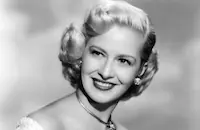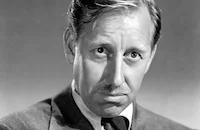New York Confidential
Brief Synopsis
Cast & Crew
Russell Rouse
Broderick Crawford
Richard Conte
Marilyn Maxwell
Anne Bancroft
J. Carrol Naish
Film Details
Technical Specs

Synopsis
In New York City, a gangster kills a fellow hoodlum for personal vengeance and consequently violates the unwritten law of the syndicate. The punishment for personal revenge that draws unwanted attention to the organization is death. Charles Lupo, the area boss, gets permission from his superior in Italy and then hires Nick Magellan from Chicago to accomplish the execution of the errant mobster, believing that Nick's anonymity in New York will make the killing go smoothly. With calm precision, Nick kills the transgressor and so impresses Charlie that he arranges to have the younger man transferred to his territory. After a murder attempt is made on Charlie, Nick serves as his bodyguard. While checking the grounds around the Lupo mansion, where Charlie lives with his mother and daughter, Nick spots a couple in a parked car and orders them out at gunpoint. The woman, who reveals that she is Charlie's daughter Katherine, slaps Nick and introduces the man as her boyfriend Stan. Inside the house, Kathy expresses her frustration at being the daughter of a mobster. She resentfully laments that, although Charlie sent her to finishing school, his occupation scares away "decent people," including Stan, who has decided that her mob connections will jeopardize his future. When Stan later tries to reconcile with her, Kathy, correctly guessing that he has accepted a bribe from Charlie, rejects him and decides to leave home. The gangland slayings attract the attention of politicians, who appoint Judge Kincaid to head a cleanup campaign to expose the syndicate. Charlie learns about the crime commission and makes plans to bribe its key members. Immensely pleased with his new employee's intelligence and loyalty, Charlie grooms Nick for success within the organization. When Charlie receives an emergency call cutting short a date with his mistress Iris Palmer, he asks Nick to take her to dinner and the theater. From that evening on, Iris tries to seduce Nick, but is politely refused. When Charlie's colleagues worry that the commission's investigation will jeopardize an oil deal, in which they have already invested $10,000,000 for legitimate expenses and bribes to Washington lobbyists, Charlie reminds them that everybody has his price. Charlie, with whom Kathy has ceased all communication, worries about her, but his mother begs him to leave her alone. Having witnessed the cycle of in-house killings over the years, Mama Lupo senses that bad times are ahead within the organization. At Charlie's request, Nick traces Kathy to a doctor's office where she uses a false name in her work as a receptionist. Over dinner, Nick, who grew up in poverty, suggests that the organization is no more corrupt than the rest of the world and advises her to accept what she has. When she insists that she is content with her new life, he agrees not to tell Charlie where she is, but warns her that it is unlikely that she can escape her situation. Although they seem compatible, both resist pursuing their relationship; Kathy because she wants to be free of the organization and Nick out of loyalty to his boss. When Charlie's best friend and right-hand man, Ben Dagajanian, is arrested for illegal entry into the country, the bosses decide that they are unable to assist him without endangering the syndicate and choose not to interfere with his deportation. Later, Paul Williamson, a lobbyist who accepted their bribe money, double-crosses them, and the key syndicate chiefs from all over the country vote unanimously to assassinate him. Charlie has disturbing premonitions about this "hit" and decides that Nick is now too important to risk, so three men are assigned to kill Williamson. During the bumbling execution of their assignment, the men kill a policeman, who dies after identifying them. To prevent their apprehension by the police, Nick is sent to kill the three men, who have scattered and await instructions. He efficiently kills two, but the third, Arnie Wendler, escapes and turns himself over to Kincaid, offering to turn state's evidence and expose Charlie. Later, a drunken Kathy comes to Nick's apartment and tells him that she was fired after newspaper reporters uncovered her identity. She then throws herself on Nick, and asks him to marry her. Although Nick sympathizes with Kathy, he rejects her proposal and warns her that she is close to a breakdown. Kathy, depressed, leaves the apartment and later dies in a car accident, which the police determine was a suicide. When their inside sources report that a "Kefauver-like" investigation is being planned, the syndicate leaders decide that Charlie must be sacrificed to relieve pressure on the organization. Understanding that the organization comes first, Charlie prepares to be tried in Washington. When it is rumored that Charlie is planning to betray them, the syndicate leaders vote to execute him before he leaves for Washington. Knowing that Nick, who thinks of Charlie as a father, can get close to Charlie, the bosses choose him as executioner, despite his request that they choose another. After Nick leaves, the bosses make additional plans to eliminate him "as insurance." Nick meets with Charlie, who guesses his purpose and resigns himself to dying. With regret, Nick says goodbye to Charlie and then shoots him and Iris. Shortly afterward, he, too, is killed by his colleagues for knowing too much.

Director
Russell Rouse
Cast

Broderick Crawford

Richard Conte

Marilyn Maxwell

Anne Bancroft

J. Carrol Naish

Onslow Stevens
Barry Kelley

Mike Mazurki
Celia Lovsky
Herbert Heyes

Steven Geray
Bill Phillips
Henry Kulky

Nestor Paiva
Joe Vitale
Carl Milletaire
William Forrest

Ian Keith
Charles Evans
Mickey Simpson

Tom Powers
Lee Trent
Lennie Bremen

John Doucette

Frank Ferguson
Hope Landon

Fortunio Bonanova
Crew
Henry Adams
Harry Alphin
Fernando Carrère
Willis Cook
Edward Fitzgerald
Clarence Greene
Clarence Greene
Carla Hadley
Roger Heman
Joseph W. Holland
Winston Jones
John Kean
James W. Lane
Norman Martien
Joseph Mullendore
Ernest Newman
Russell Rouse
Walter Sheets
Edward Small
Maurie M. Suess
Harry Thomas
Robert Tracy
Brant Whytock

Film Details
Technical Specs

Articles
New York Confidential - Broderick Crawford & Anne Bancroft in the 1955 Film Noir, NEW YORK CONFIDENTIAL
Richard Conte is topnotch here as a young assassin named Nick Magellan who is pulled from his Chicago post to work for Charlie Lupo (Broderick Crawford), head of the New York division of "the syndicate." The syndicate is a national crime organization that operates almost as a shadow government, with its own hierarchy and business operations; if a member of this mob causes trouble or threatens to blow the whistle, he is swiftly murdered by enforcers like Magellan. At the time, this was new, fascinating stuff to movie audiences, and it still draws one in compellingly.
The film also makes much of depicting the gangsters as normal businessmen and family men. An early scene with Broderick Crawford in his office, for instance, has him not only taking a phone call from the mob boss in Italy and arranging a contract killing, but also looking at a partner's baby pictures, talking about wives and kids, and yearning comedically for "a salami on rye with a kosher pickle" -- just a normal day at the office, in other words. It's a bit labored and obvious, but the point is still effective. The film will further this idea by ratcheting up both the violence and the family melodrama to extreme levels, and this is what puts New York Confidential above the norm for such films and marks it as an obvious influence on Francis Coppola and the Godfather films.
In the cast, Broderick Crawford operates on all cylinders; he's just on fire in every scene, barking about the "pigs" who get in his way and trying to control his daughter (Anne Bancroft) by sheer vocal volume. In another movie, the performance would be over the top, but here it works to build intensity of the drama overall.
It also makes for a compelling contrast with Richard Conte, whose soft-spoken politeness belies not only Crawford's tirades but Conte's own murderous professionalism. Conte is so very good here, whether he's calmly walking out of a restaurant after cold-bloodedly gunning down three men inside (a simple-yet-stunning scene which surely influenced Coppola and Scorsese); learning the word "penchant" and then using it right away to impress his new boss; bursting dramatically into a hoodlum's office to rough him up; or flirting with Lupo's secretary like James Bond soon will with Miss Moneypenny. When Conte is on screen, you can't take your eyes off the guy, and that's always true of Conte. He embodies a mixture of calm and menace, courtesy and cruelty, that is quite mesmerizing.
Anne Bancroft had appeared in various noirs and westerns at this point in her young career, and her role here is substantial. She is petulant and sensual (and fetching) as the mobster's daughter whose boyfriends get roughed up for no reason when she brings them home, and who understandably struggles to escape this sordid world, crying out tragically that "decent people don't want me around. It's as if I had a disease."
With all the violence and family gravitas, New York Confidential also works in a fair amount of humor. Crawford finally gets his salami sandwich, for instance, but in the next scene asks for a bicarbonate of soda. It's a smart use of comedy, for it subtly helps to humanize these malicious characters and make us feel something for them, or at least care about what happens to them. Crawford's Charlie Lupo may be an unlikable, vicious fellow, but when the mob places a hit on him, the film has made us want him to escape.
In the end, New York Confidential stays true to itself and the grim world it inhabits. For one character, suicide is the only escape. For others, it's death by murder, which is shown to be necessary for the syndicate -- the source of all this evil -- to continue unchallenged. There will always be new young killers, new hoods, new "businessmen" ready to take over. The power of the mob is relentless, and the feeling of being trapped in its grasp lends a fatalism that ultimately reaches existential proportions and lands New York Confidential firmly in film noir territory. It's a powerful ride.
VCI Entertainment's DVD of New York Confidential is enhanced for 1.85 widescreen and comes with some extras, which are welcome in this era of barebones catalogue releases. There's an advertising gallery and a restoration comparison, but most notably, film historians Alan K. Rode and Kim Morgan team to provide a commentary track rich in historical context. They know this movie, and they're especially thorough on the backgrounds of the actors, right down to the bit players.
For more information about New York Confidential, visit VCI Entertainment. To order New York Confidential, go to TCM Shopping.
by Jeremy Arnold

New York Confidential - Broderick Crawford & Anne Bancroft in the 1955 Film Noir, NEW YORK CONFIDENTIAL
Quotes
Trivia
Notes
Documentary-style voice-over narration is heard intermittently throughout the film. The opening narration introduces New York City as the "nerve center" of an organization of hoodlums clothed in respectability, called the "syndicate." At the end of the film, the narrator explains that the syndicate still exists and states: "This is how the cartel works. This is New York Confidential." A May 1954 Hollywood Reporter news item announced that the film would be partially shot in the new Eastman Tri-X film, which required no special lighting for night shooting.
Producer Edward Small originally had a "loose agreement" with United Artists to distribute the film, but, according to a January 1955 Variety news item, he had been negotiating with other studios, including Columbia and M-G-M, before closing the deal with Warner Bros. Although the film New York Confidential retained the title of the novel, the property was considerably reworked. According to a September 1953 Los Angeles Examiner news item, one of the original stories in the novel told of the electric chair execution of Lepke Buchalter, who surrendered himself to columnist Walter Winchell. The New York Times review reported that the New York Anti-Crime Committee vouched for the film's "overall authenticity."

Miscellaneous Notes
Released in United States Spring March 1955
Released in United States Spring March 1955













